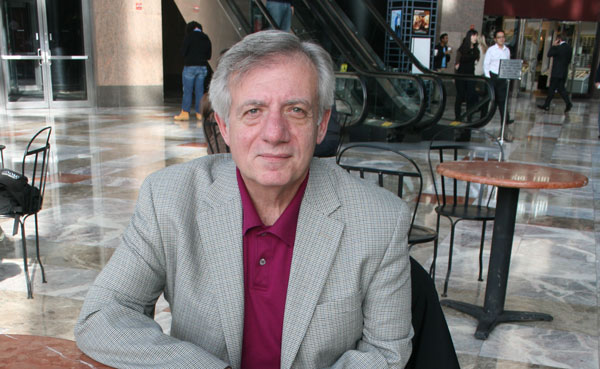[media-credit id=1 align=”aligncenter” width=”600″] [/media-credit]BY ALINE REYNOLDS | Community Board 1 member Anthony Notaro, co-chair the board’s planning and community infrastructure committee and chair of its Battery Park City Community Center task force, was elected secretary at the October full board meeting. Notaro discusses why he ran for the position, the skills he’ll bring to the table and his thoughts on salvaging the World Financial Center’s Winter Garden staircase.
[/media-credit]BY ALINE REYNOLDS | Community Board 1 member Anthony Notaro, co-chair the board’s planning and community infrastructure committee and chair of its Battery Park City Community Center task force, was elected secretary at the October full board meeting. Notaro discusses why he ran for the position, the skills he’ll bring to the table and his thoughts on salvaging the World Financial Center’s Winter Garden staircase.
Why did you choose to run for secretary?
When Noel [Jefferson] announced that she wanted to step down, it was an opening that needed to be filled fairly quickly. I talked to a couple of friends and other board members about it, and thought it was a place where I could add some value to the board leadership. Also, I thought it [would be] a good way to continue my contribution to the board. When you work on one or two committees, you don’t always see issues coming up and discussions of the other committees. [Being secretary] gives you just that more global view of the board.
What attributes can you bring to the position?
What I can add to it is objectivity. I’m an excellent listener and won’t try to characterize things other than what was said or done. And that’s important for us all, since many of the issues we deal with are very emotional and people are very passionate. I think it’s important to have some straightforward reporting. I’m also organized and have project management skills, which allows me to set out goals and measure my progress.
What will your responsibilities be as secretary?
In one sense, it’s very, very specific — you take the minutes and record those meetings as accurately as possible. You are also a part of the board’s elected, executive committee, and hopefully it gives you a little more visibility into other issues than you would normally look at.
Do you see the position as a stepping-stone?
I haven’t thought of any future plans. Everybody knows I’ve run for [C.B. 1] chair twice in the past, but I’ve never made the claim to run again. I think there are a couple of other people that would make excellent chairpersons, so it wasn’t a consideration in my decision. And besides, adding work on isn’t necessarily the greatest stepping-stone for something!
What’s your daily job?
I’m a regional vice president for a technology company called Technologent. We design computer systems and technology infrastructure for our customers, and I provide sales marketing and support to them.
In mid-June, Brookfield Office Properties announced plans to keep the World Financial Center’s Winter Garden staircase. Were you pleased about this? Why do you think they changed their mind?
I was kind of neutral to begin with. Sometimes we look at things from a very sentimental value. It is a beautiful staircase; however, when it was originally proposed to us it needed to be [taken down] because of pedestrian traffic, it made sense. So when they announced they weren’t going to move it, I was pretty shocked. I was thinking, ‘if you told us it was so strongly necessary, what changed?’ I’m absolutely fine with [their] keeping it, but I can’t give you a good answer why they decided to keep it.
As a B.P.C resident, how frequently do you use the Winter Garden?
I’m [there] three or four times a week. I kind of use it as a meeting place to grab a cup of coffee, chat, and have planning sessions. I tell people it’s almost like our Village Green. We’re very fortunate to have the space.
On a separate note, what do you think of C.B. 1’s Occupy Wall Street resolution?
I think the resolution is [putting us] in the right direction. Our primary function is representing the community — so, while most people agree with a lot of the issues and topics that O.W.S. has brought up, you can agree with that and be passionate about it, but that’s different than the occupation of Zuccotti Park. To me, those are two separate issues. The board has to focus on how it affects the quality of life for both businesses and residents here. That’s kind of a guiding way to look at it, because it’s a really complex issue.






































